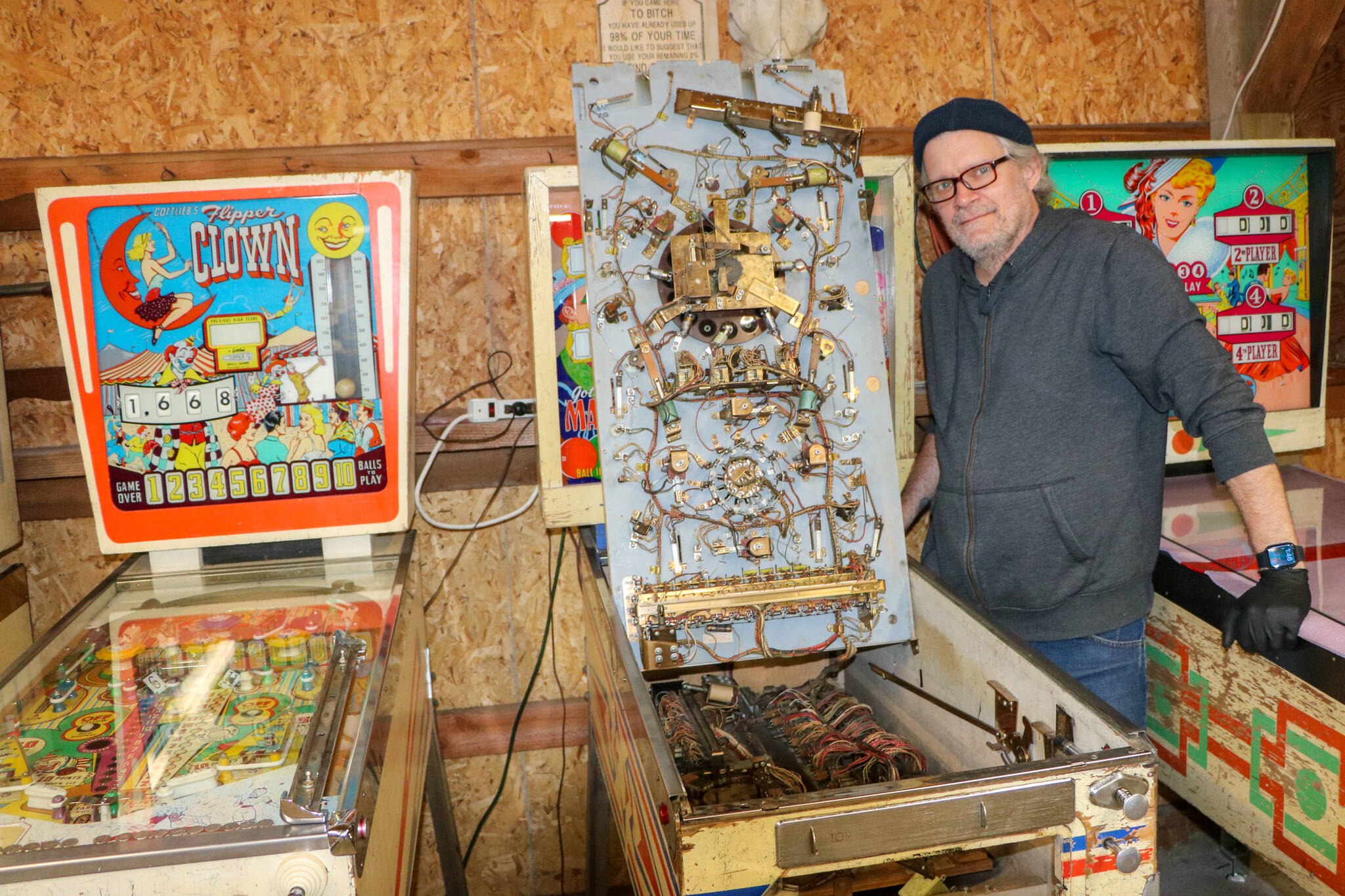Mo Davis is turning his pandemic-born passion for pinball into a community hub on Vashon Island.
After years of visiting the island with his family, Davis finally made the move from Portland on the Fourth of July, settling just down the road from his in-laws.
Originally from Iowa, his father’s police work brought the family to Seattle during his high school years. Afterward, Davis spent two decades in Portland, where he and his wife raised their two children: Silas, now 28, and Vivian, who is nine. His wife, a native of Vashon Island, always dreamed of returning to her roots.
“It’s every kid’s dream to get to live down the street from their grandparents,” Davis said.
A former science teacher at a Portland charter school, Davis is now on a one-year teaching sabbatical. Rather than grading papers, he’s immersing himself in the world of pinball — a hobby that turned into an obsession during the COVID-19 pandemic.
With arcades closed, he had nowhere to play, so Davis began collecting and repairing machines he found on Craigslist.
“Part of what constitutes being a good teacher is not necessarily knowing things, but knowing how to know things,” Davis explained. “I am going to learn new things that are hard so I can remember what it is like to be a learner so I don’t leave kids behind,” he said.
“Like me,” his daughter Vivian, exclaimed.
This philosophy drove him to learn the intricate wiring, schematics, and mechanical logic behind pinball machines. What started with a single game in 2020 quickly grew into a collection, where he now stores 14 games: two four-player, and twelve single-player.
Today, Davis has restored and owned more than 100 pinball machines and frequently repairs machines for individuals and businesses. His collection is limited to games from the 60s and 70s, which he finds more intriguing due to their increased complexity, he said.
“I’m kind of horrible,” Davis said. “I am way better at fixing them than I am at playing them.”
“I am still trying to beat my dad’s high score,” Vivian said.
For Davis, what began as a love for the game developed into a deep interest in the history and cultural significance of the machines.
Pinball, once dismissed as a mere game of chance, was long embroiled in legal battles over its association with gambling. For decades, the game was banned in several major U.S. cities, including New York, with authorities arguing that it relied more on luck than skill.
It wasn’t until the 1970s, when players demonstrated the level of skill involved — specifically through the use of flippers — that pinball was reclassified as a game of skill.
South Carolina remains the only state in the country where pinball is still illegal for minors, maintaining a unique statewide ban that dates back decades.
“It’s so scandalous,” Davis said. “And people don’t know the story, so I want to have a museum that tells the story and allows people to play games.”
Davis’s dream is to open an interactive pinball museum on Vashon. He envisions a space where people can not only play but also learn about the history, mechanics, and art of pinball.
“The smell, the warmth of the games as they heat up, and all the mechanical coils and light bulbs, the incandescent bulbs, it is so magical,” Davis said.
Until then, Davis continues to tinker in his garage, repairing machines and preparing for an upcoming pinball tournament which he will host in his garage on Sept. 29. He is actively searching for a place in town to put his vision.
“At some point, you have to listen to the dream that you have in your garage,” Davis said. “[The] garage has been the catalyst for so many great things throughout the history of modern humans — computers were born in a garage, great bands were born in garages.”
For Davis, pinball is more than a game — it’s a way to connect with the past, to create something lasting and to contribute to his new community on Vashon Island.
“It’s like a time machine,” Davis said. “It takes you back to an age that does not exist anymore. … This all comes back to the idea of wanting to leave a mark and contribute something, to be a valuable person, a valuable community member.”
On his website denofpin.com, you can still sign up to participate in the tournament, or contact him if you need a repair.



